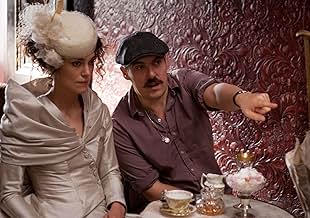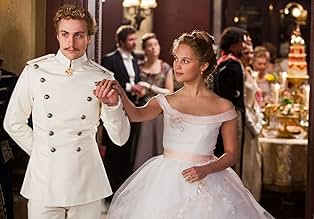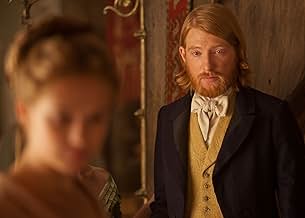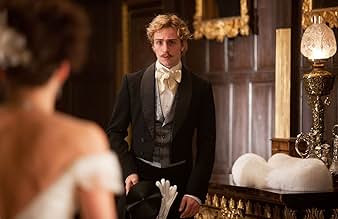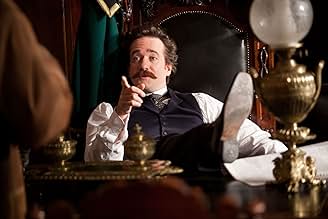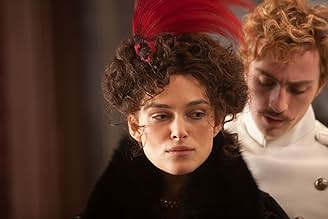A finales del siglo 19 en la alta sociedad de San Petersburgo, la aristócrata Anna Karerina da pie a una aventura con el encantador conde Alexei Vronsky.A finales del siglo 19 en la alta sociedad de San Petersburgo, la aristócrata Anna Karerina da pie a una aventura con el encantador conde Alexei Vronsky.A finales del siglo 19 en la alta sociedad de San Petersburgo, la aristócrata Anna Karerina da pie a una aventura con el encantador conde Alexei Vronsky.
- Dirección
- Guionistas
- Elenco
- Ganó 1 premio Óscar
- 33 premios ganados y 54 nominaciones en total
- Dirección
- Guionistas
- Todo el elenco y el equipo
- Producción, taquilla y más en IMDbPro
Opiniones destacadas
I adore the novel, so I will be discussing Joe Wright's take on it and where it ranks amongst other adaptations but I will of course look at its merits as a film aside from the novel.
As a whole adaptation, this version falls somewhere in the middle. Even without all the metatheatrical trappings, it still took an interesting and valid approach to the novel, proving that the novel could be adapted until infinity and it would still be fresh each time. As readers of the novel would know, there is much more to it than Anna's affair. Tolstoy did not write vague types: he wrote fully-fleshed characters, and Tom Stoppard's screenplay acknowledged Tolstoy's style. Therefore I don't want to condemn the film outright because that would overshadow the things that it does get right.
Keira Knightley's version of Anna is not nearly as bad as you would think. She has the sense to restrain herself a little so that the many other elements of the novel shine through. She goes for the unsympathetic approach and it works. All her mannerisms that I generally find annoying- the schoolgirl smirking and rampant nymphomania- actually work for this role. This Anna takes Vronsky just because she can, and then ultimately regrets it. We can feel her frustration: she's young and wants to have fun but she's tied down to a stuffy older husband. In that sense, it's quite a modern interpretation, but not hideously so.
Aaron Taylor-Johnson as Count Vronsky was just miscast. If the novel had been about Anna seducing a schoolboy, he would have been great, but Vronsky is meant to be a dashing man. The styling is atrocious- he looks like a seventies Scandinavian Eurovision entry. Wright seems to have told some of the actors to act realistic and some to play up to the stylised setting. Taylor-Johnson plays the artifice so much that he just comes off as camp and sleazy. The scene where he is about to ride Frou Frou is like a production of Equus and there's a love scene with Keira Knightley that brought to mind an old advert for Philadelphia cheese. Their revelation of love is also poorly dealt with. Anna has some kind of fantasy dream where the two have an "erotic ballet" and suddenly they're banging away, presumably now in the real world.
Jude Law as Karenin. A bizarre choice when he could have played Vronsky five years ago and might even get away with it now at a push. However, he gives a performance that is probably his best. His Karenin is a bureaucrat through and through. Other adaptations have still made Karenin an attractive option. This Karenin is certainly not going to develop any great passion soon. We also see how he is manipulated by moral guardian Countess Lydia. If Law is trying to make a reputation as a serious actor, he's on the right path.
And what about all that pretentious theatre stuff? It seriously slows down the pace in the first third but once you get used to it, you can just enjoy the film. The ending is rather abrupt (no, that famous ending is not the last scene) but quite poignant.
As a whole adaptation, this version falls somewhere in the middle. Even without all the metatheatrical trappings, it still took an interesting and valid approach to the novel, proving that the novel could be adapted until infinity and it would still be fresh each time. As readers of the novel would know, there is much more to it than Anna's affair. Tolstoy did not write vague types: he wrote fully-fleshed characters, and Tom Stoppard's screenplay acknowledged Tolstoy's style. Therefore I don't want to condemn the film outright because that would overshadow the things that it does get right.
Keira Knightley's version of Anna is not nearly as bad as you would think. She has the sense to restrain herself a little so that the many other elements of the novel shine through. She goes for the unsympathetic approach and it works. All her mannerisms that I generally find annoying- the schoolgirl smirking and rampant nymphomania- actually work for this role. This Anna takes Vronsky just because she can, and then ultimately regrets it. We can feel her frustration: she's young and wants to have fun but she's tied down to a stuffy older husband. In that sense, it's quite a modern interpretation, but not hideously so.
Aaron Taylor-Johnson as Count Vronsky was just miscast. If the novel had been about Anna seducing a schoolboy, he would have been great, but Vronsky is meant to be a dashing man. The styling is atrocious- he looks like a seventies Scandinavian Eurovision entry. Wright seems to have told some of the actors to act realistic and some to play up to the stylised setting. Taylor-Johnson plays the artifice so much that he just comes off as camp and sleazy. The scene where he is about to ride Frou Frou is like a production of Equus and there's a love scene with Keira Knightley that brought to mind an old advert for Philadelphia cheese. Their revelation of love is also poorly dealt with. Anna has some kind of fantasy dream where the two have an "erotic ballet" and suddenly they're banging away, presumably now in the real world.
Jude Law as Karenin. A bizarre choice when he could have played Vronsky five years ago and might even get away with it now at a push. However, he gives a performance that is probably his best. His Karenin is a bureaucrat through and through. Other adaptations have still made Karenin an attractive option. This Karenin is certainly not going to develop any great passion soon. We also see how he is manipulated by moral guardian Countess Lydia. If Law is trying to make a reputation as a serious actor, he's on the right path.
And what about all that pretentious theatre stuff? It seriously slows down the pace in the first third but once you get used to it, you can just enjoy the film. The ending is rather abrupt (no, that famous ending is not the last scene) but quite poignant.
I once asked Dustin Hoffman if he had any favorite movies or actors. He replied that he had favorite performances. Referring it seemed, to much smaller periods within a film. There are several shots where Keira is picture perfect, but this role was not for her. This performance ruins our memory of her former success under Joe Wright. Especially her first, which is her most unforgettable. Black Swan did the same for Natalie Portman, another of our cinema sweethearts. Which I walked out of.
Her part here needed to be much deeper and more complex, but instead it was shallow and trite. The way Anna was portrayed was out of place. Whether by acting or writing I don't know. Either way it was a mistake. All of the male leads, four at my count, complemented each other perfectly and were well done. Some surprising cameos among the women.
I didn't see it at the theater after hearing about the stage within the movie technique, which has actually been done in a few good movies. I didn't see it as a problem. The recent film Anonymous about Shakespeare began this way, as do others based on plays of his. Julie Taymore in her solo attempt to put Titus on film blended styles while injecting modern means and mechanism into near ancient settings, and pulled it off very smartly. Both of these were good films and highly worth watching. I point this out as there were many complaints about it in other reviews.
It isn't the blending of the modern and the ancient, or the use of multiple styles in itself that is a problem. It's more a question of whether it works, and how well it was done. I believe here it does. Peter Greenaway excels at this kind of film making. We sometimes forget how shallow we have become as a society. What a melange and patchwork our culture is. Are we surprised it shows up in our films.
There are some moments of clarity in the movie that are almost bewitching. While others present motion picture as painting or poetry. Some very good transitions. Overall I believe it to be a very creative effort. It is a blending of choreography, stage, and cinema with a desire to please the eye and entertain our emotions. It was only the moral ambiguity and modern sensibilities between the two lovers I found contemptible. Both of them being out of time and out of place.
Love is the great conquerer of lust. As lust is the great destroyer of love. I believe the author intended this to be about the second. It is a mistake to think movies from books should be the book. Just as it is wrong for an amoral people to replace the beliefs of a moral people . . with their own. Especially when borrowing or telling their stories. One of the great enjoyments for all lovers of period pieces is going back to a time when people knew morality and understood what it was, and most agreed with it. Whether or not they actually were moral is entirely . . another story.
http://fullgrownministry.wordpress.com/2013/08/04/covet/
Her part here needed to be much deeper and more complex, but instead it was shallow and trite. The way Anna was portrayed was out of place. Whether by acting or writing I don't know. Either way it was a mistake. All of the male leads, four at my count, complemented each other perfectly and were well done. Some surprising cameos among the women.
I didn't see it at the theater after hearing about the stage within the movie technique, which has actually been done in a few good movies. I didn't see it as a problem. The recent film Anonymous about Shakespeare began this way, as do others based on plays of his. Julie Taymore in her solo attempt to put Titus on film blended styles while injecting modern means and mechanism into near ancient settings, and pulled it off very smartly. Both of these were good films and highly worth watching. I point this out as there were many complaints about it in other reviews.
It isn't the blending of the modern and the ancient, or the use of multiple styles in itself that is a problem. It's more a question of whether it works, and how well it was done. I believe here it does. Peter Greenaway excels at this kind of film making. We sometimes forget how shallow we have become as a society. What a melange and patchwork our culture is. Are we surprised it shows up in our films.
There are some moments of clarity in the movie that are almost bewitching. While others present motion picture as painting or poetry. Some very good transitions. Overall I believe it to be a very creative effort. It is a blending of choreography, stage, and cinema with a desire to please the eye and entertain our emotions. It was only the moral ambiguity and modern sensibilities between the two lovers I found contemptible. Both of them being out of time and out of place.
Love is the great conquerer of lust. As lust is the great destroyer of love. I believe the author intended this to be about the second. It is a mistake to think movies from books should be the book. Just as it is wrong for an amoral people to replace the beliefs of a moral people . . with their own. Especially when borrowing or telling their stories. One of the great enjoyments for all lovers of period pieces is going back to a time when people knew morality and understood what it was, and most agreed with it. Whether or not they actually were moral is entirely . . another story.
http://fullgrownministry.wordpress.com/2013/08/04/covet/
The staging of this film is certainly something I hadn't seen before. The majority of scenes are made to look like everything is happening on a theater stage. This style doesn't add a whole lot to the film though. While the costumes, production design, music, and cinematography are all terrific, I'm afraid I can't say the same about the story. It just didn't really capture me and I found a lot of the film to be boring. Anna Karenina may be a classic text, but I can't use the same adjective for this retelling.
It took me about an hour to stop being irritated by the movie's self consciousness, to sort of enjoy it... but the damage was done.
As viewers, we have no reason to believe in the love Anna finds. He is creepy and give us no inkling of why she might ruin her life for him.
Kiera isn't bad, just annoying, considering we have no empathy for her self indulgence. If her husband was worse, her love a lot nicer, and if we could feel electricity between them, it would be a different matter, but the fact is the movie is too busy being clever... it misses out on having a heart and soul.
The theatre gimmick got in the way, and seemed like a cheap way of having Moscow backdrops without actually traveling there.
5/10
As viewers, we have no reason to believe in the love Anna finds. He is creepy and give us no inkling of why she might ruin her life for him.
Kiera isn't bad, just annoying, considering we have no empathy for her self indulgence. If her husband was worse, her love a lot nicer, and if we could feel electricity between them, it would be a different matter, but the fact is the movie is too busy being clever... it misses out on having a heart and soul.
The theatre gimmick got in the way, and seemed like a cheap way of having Moscow backdrops without actually traveling there.
5/10
Director Joe Wright's adaptation of Leo Tolstoy's 1877 novel Anna Karenina is one of the most visually stunning and artistically bold films I've seen in quite some time. Wright places most of his plot within the confines of a dilapidated theatre and has his actors make use of the stage, stalls and behind the scenes areas when forming the sets of late Tsarist Saint Petersburg. Actors will walk from one part of the theatre to another with sets and costumes changing around them, all with the hustle and bustle of both a real theatre and lively city. It's a stylistic decision which was probably met with scepticism by studio bosses and the like but works incredibly well to bring to life the characters which themselves are so wonderfully written by Tolstoy.
Joe Wright was lucky in a way in that he started off with a fantastic story, written by Tolstoy. This was then adapted by Oscar winning screenwriter Tom Stoppard who handed Wright and his cast a beautifully well crafted script which despite its complexities, rolls of the tongues of the talented cast. I have never read the source novel and have in fact never managed to finish any of the great works of Russian literature (the names don't help) so the plot was new to me. The themes of love, infidelity, trust and city vs countryside-life charge out of the screen and most are tackled very well. One area which I thought was slightly forgotten was the fascinating part of the plot regarding Levin (Domhnall Gleeson). Levin is in love with an attractive and highly sought after young Princess, Kitty (Alicia Vikander). His tale of love, family, hardship and politics feels slightly brushed to one side which is a shame as his arc also points towards the social upheaval which would greet Russia in the coming decades.
The first half of this film was probably my favourite half of any I've seen in the cinema this year. It whizzed along thanks to the dialogue, plot and interesting design. The problems that I have with some period dramas such as dull ideas and duller characters felt a million miles away as I watched, transfixed with a smile on my face. The highlight of the entire film for me was a ball in which some of the central characters danced. This was a scene full of careful manoeuvring, examination and lust as the two lovers become intimate for the first time. Onlookers watch on as Anna and Count Vronsky dance a waltz to an ever quickening pace. Kitty watches with horror as she sees the man she thought was hers slip away. The dancing itself is beautifully choreographed and came as close to art as I've seen dance be. Due in part to the nature of the story, the second half of the film doesn't quite live up to the pace or intensity of the opening half but is nonetheless interesting, dark and impressive.
There are three things which make Anna Karenina one of my favourite films of 2012 so far. The first is the story, the second is the direction and the third is the acting. Every single member of the cast dazzles here with not one actor giving a misjudged or poor performance. The standout for me is Jude Law whose mild mannered and restrained performance is simply incredible. He maintains grace and dignity despite having a terrible spell thanks to Anna and Law manages to convey all of his emotions in a similar understated way to Gary Oldman did with Smiley in Tinker, Tailor, Soldier, Spy. He also makes the audience feel incredibly empathetic towards his character. For an actress I'm not particularly fond of, Keira Knightly has somehow found herself with two excellent central performances in two of my favourite films of the year; this and A Dangerous Method. She feels like the go-to-girl for this type of role and is excellent although my girlfriend rightly points out that when she smiles, she looks like she's about to cry. Aaron Taylor-Johnson also gives a good performance, despite comedy moustache, as the dashing lover. He is believable as the swarve and arrogant cavalryman but is outplayed by Law in later scenes. It's funny to think that ten years ago it would probably have been Jude Law in the Vronsky role but he has matured as an actor in recent years and can carry off a character like Karenin with aplomb. Another standout is Matthew Macfadyen who plays more of a comedy character but plays it gracefully. Domhnall Gleeson is also superb as Levin.
Despite the great acting this is the director's film. The style is so bold that at first I was worried that it wouldn't work but to keep a city as vast as Saint Petersburg inside one theatre then having the rest of the world to play with outside the city was a fantastic idea which was pulled off with pinpoint precision. There are flaws, for instance it felt slightly too long and some areas weren't given as much attention as I'd have liked (two contradictory statements I know) but overall Anna Karenina is a enchanting film and one of the best I've seen so far this year.
www.attheback.blogspot.com
Joe Wright was lucky in a way in that he started off with a fantastic story, written by Tolstoy. This was then adapted by Oscar winning screenwriter Tom Stoppard who handed Wright and his cast a beautifully well crafted script which despite its complexities, rolls of the tongues of the talented cast. I have never read the source novel and have in fact never managed to finish any of the great works of Russian literature (the names don't help) so the plot was new to me. The themes of love, infidelity, trust and city vs countryside-life charge out of the screen and most are tackled very well. One area which I thought was slightly forgotten was the fascinating part of the plot regarding Levin (Domhnall Gleeson). Levin is in love with an attractive and highly sought after young Princess, Kitty (Alicia Vikander). His tale of love, family, hardship and politics feels slightly brushed to one side which is a shame as his arc also points towards the social upheaval which would greet Russia in the coming decades.
The first half of this film was probably my favourite half of any I've seen in the cinema this year. It whizzed along thanks to the dialogue, plot and interesting design. The problems that I have with some period dramas such as dull ideas and duller characters felt a million miles away as I watched, transfixed with a smile on my face. The highlight of the entire film for me was a ball in which some of the central characters danced. This was a scene full of careful manoeuvring, examination and lust as the two lovers become intimate for the first time. Onlookers watch on as Anna and Count Vronsky dance a waltz to an ever quickening pace. Kitty watches with horror as she sees the man she thought was hers slip away. The dancing itself is beautifully choreographed and came as close to art as I've seen dance be. Due in part to the nature of the story, the second half of the film doesn't quite live up to the pace or intensity of the opening half but is nonetheless interesting, dark and impressive.
There are three things which make Anna Karenina one of my favourite films of 2012 so far. The first is the story, the second is the direction and the third is the acting. Every single member of the cast dazzles here with not one actor giving a misjudged or poor performance. The standout for me is Jude Law whose mild mannered and restrained performance is simply incredible. He maintains grace and dignity despite having a terrible spell thanks to Anna and Law manages to convey all of his emotions in a similar understated way to Gary Oldman did with Smiley in Tinker, Tailor, Soldier, Spy. He also makes the audience feel incredibly empathetic towards his character. For an actress I'm not particularly fond of, Keira Knightly has somehow found herself with two excellent central performances in two of my favourite films of the year; this and A Dangerous Method. She feels like the go-to-girl for this type of role and is excellent although my girlfriend rightly points out that when she smiles, she looks like she's about to cry. Aaron Taylor-Johnson also gives a good performance, despite comedy moustache, as the dashing lover. He is believable as the swarve and arrogant cavalryman but is outplayed by Law in later scenes. It's funny to think that ten years ago it would probably have been Jude Law in the Vronsky role but he has matured as an actor in recent years and can carry off a character like Karenin with aplomb. Another standout is Matthew Macfadyen who plays more of a comedy character but plays it gracefully. Domhnall Gleeson is also superb as Levin.
Despite the great acting this is the director's film. The style is so bold that at first I was worried that it wouldn't work but to keep a city as vast as Saint Petersburg inside one theatre then having the rest of the world to play with outside the city was a fantastic idea which was pulled off with pinpoint precision. There are flaws, for instance it felt slightly too long and some areas weren't given as much attention as I'd have liked (two contradictory statements I know) but overall Anna Karenina is a enchanting film and one of the best I've seen so far this year.
www.attheback.blogspot.com
¿Sabías que…?
- TriviaOne of Alicia Vikander's favorite experiences from the production was the filming that took place in the countryside outside of St. Petersburg, Russia. The temperatures dropped below -40 °C, and she stayed in a cabin for five days that didn't have hot water and only featured benches instead of beds. Meanwhile, Russian security guards protected her and co-star 'Domhnall Gleeson' from wild wolves and bears that dominated the deserted area.
- ErroresThe label of the bottle of morphine Anna drinks from changes from "la Morphine" to "Morphine" between shots. The only correct French form would be without an article (prescriptions would have been written in Latin in 19th-century Russia anyway).
- ConexionesFeatured in Projector: Anna Karenina (2012)
- Bandas sonorasSong for a New Life (Masha's Song)
(uncredited)
Written by Anoushka Shankar
Performed by Tannishtha Chatterjee
Selecciones populares
Inicia sesión para calificar y agrega a la lista de videos para obtener recomendaciones personalizadas
- How long is Anna Karenina?Con tecnología de Alexa
Detalles
- Fecha de lanzamiento
- Países de origen
- Sitio oficial
- Idioma
- También se conoce como
- Chuyện Tình Anna
- Locaciones de filmación
- Kizhi, Karelia, Rusia(on location)
- Productoras
- Ver más créditos de la compañía en IMDbPro
Taquilla
- Presupuesto
- USD 40,600,000 (estimado)
- Total en EE. UU. y Canadá
- USD 12,816,367
- Fin de semana de estreno en EE. UU. y Canadá
- USD 320,690
- 18 nov 2012
- Total a nivel mundial
- USD 68,929,150
- Tiempo de ejecución2 horas 9 minutos
- Color
- Mezcla de sonido
- Relación de aspecto
- 2.35 : 1
Contribuir a esta página
Sugiere una edición o agrega el contenido que falta

Principales brechas de datos
What is the streaming release date of Anna Karenina (2012) in Canada?
Responda






